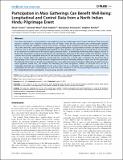Files in this item
Participation in mass gatherings can benefit well-being : longitudinal and control data from a North Indian Hindu pilgrimage event
Item metadata
| dc.contributor.author | Tewari, Shruti | |
| dc.contributor.author | Khan, Sammyh | |
| dc.contributor.author | Hopkins, Nick | |
| dc.contributor.author | Srinivasan, Narayanan | |
| dc.contributor.author | Reicher, Stephen David | |
| dc.date.accessioned | 2012-11-23T12:01:02Z | |
| dc.date.available | 2012-11-23T12:01:02Z | |
| dc.date.issued | 2012-10-17 | |
| dc.identifier | 38018708 | |
| dc.identifier | d5c61633-e31a-489e-9035-36727f55c04d | |
| dc.identifier | 84867655659 | |
| dc.identifier.citation | Tewari , S , Khan , S , Hopkins , N , Srinivasan , N & Reicher , S D 2012 , ' Participation in mass gatherings can benefit well-being : longitudinal and control data from a North Indian Hindu pilgrimage event ' , PLoS One , vol. 7 , no. 10 , e47291 . https://doi.org/10.1371/journal.pone.0047291 | en |
| dc.identifier.issn | 1932-6203 | |
| dc.identifier.uri | https://hdl.handle.net/10023/3265 | |
| dc.description.abstract | How does participation in a long-duration mass gathering (such as a pilgrimage event) impact well-being? There are good reasons to believe such collective events pose risks to health. There are risks associated with communicable diseases. Moreover, the physical conditions at such events (noise, crowding, harsh conditions) are often detrimental to well-being. Yet, at the same time, social psychological research suggests participation in group-related activities can impact well-being positively, and we therefore investigated if participating in a long-duration mass gathering can actually bring such benefits. In our research we studied one of the world's largest collective events – a demanding month-long Hindu religious festival in North India. Participants (comprising 416 pilgrims who attended the gathering for the whole month of its duration, and 127 controls who did not) completed measures of self-assessed well-being and symptoms of ill-health at two time points. The first was a month before the gathering commenced, the second was a month after it finished. We found that those participating in this collective event reported a longitudinal increase in well-being relative to those who did not participate. Our data therefore imply we should reconceptualise how mass gatherings impact individuals. Although such gatherings can entail significant health risks, the benefits for well-being also need recognition. Indeed, an exclusive focus on risk is misleading and limits our understanding of why such events may be so attractive. More importantly, as our research is longitudinal and includes a control group, our work adds robust evidence to the social psychological literature concerning the relationship between participation in social group activities and well-being. | |
| dc.format.extent | 131394 | |
| dc.language.iso | eng | |
| dc.relation.ispartof | PLoS One | en |
| dc.subject | BF Psychology | en |
| dc.subject | SDG 3 - Good Health and Well-being | en |
| dc.subject.lcc | BF | en |
| dc.title | Participation in mass gatherings can benefit well-being : longitudinal and control data from a North Indian Hindu pilgrimage event | en |
| dc.type | Journal article | en |
| dc.contributor.sponsor | Economic & Social Research Council | en |
| dc.contributor.institution | University of St Andrews. School of Psychology and Neuroscience | en |
| dc.contributor.institution | University of St Andrews. St Andrews Sustainability Institute | en |
| dc.identifier.doi | https://doi.org/10.1371/journal.pone.0047291 | |
| dc.description.status | Peer reviewed | en |
| dc.identifier.grantnumber | RES-062-23-1449 | en |
This item appears in the following Collection(s)
Items in the St Andrews Research Repository are protected by copyright, with all rights reserved, unless otherwise indicated.

